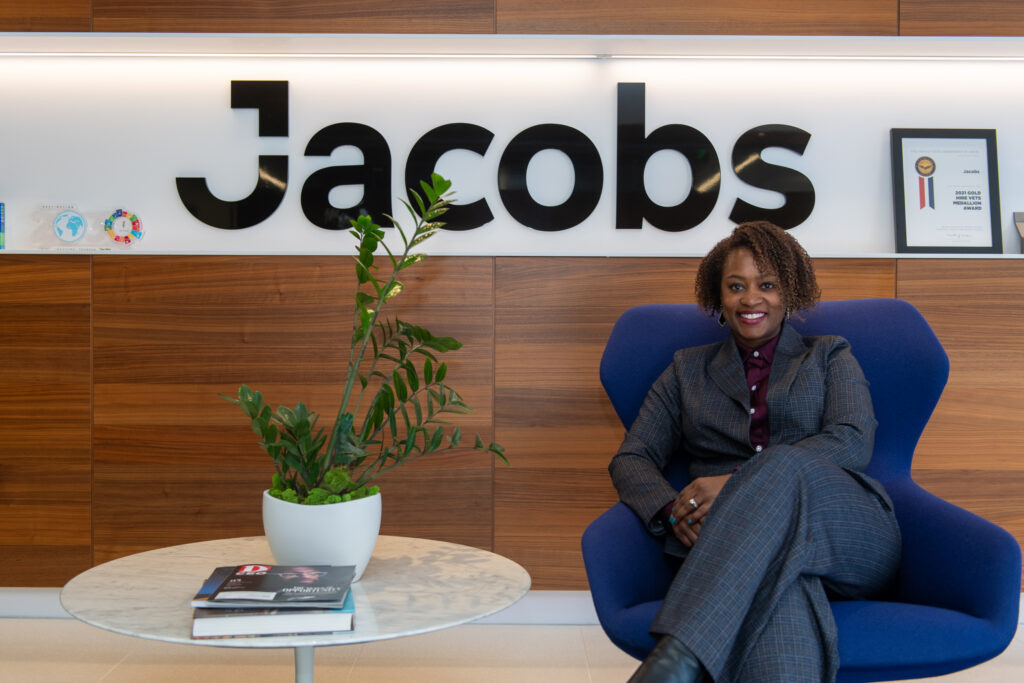
Chasity Henry was clerking in the litigation section at Vinson & Elkins during the summer of 2005 when she decided to spend one week working with the law firm’s corporate practice “just to see what it was all about.”
“It was not a good experience,” Henry told The Texas Lawbook. “I just had no idea what I was doing. I was asked to revise a contract and was at a complete loss. In my mind, that week of discomfort confirmed that I would be a litigator, and I accepted my offer with the firm and started my career with that intent.”
After graduating from the University of Texas School of Law in 2006, Henry joined the litigation practice at V&E.
“A funny thing happened on my way to becoming a litigation partner,” she said. “I discovered that I was much more interested in the inner workings of our clients’ businesses, the capital markets, in organic growth opportunities and macroeconomic factors impacting our clients and their industries than I was about actually going to trial.
“After seeking wise counsel from mentors at the firm and in-house, I decided that I wanted the opportunity to impact business and strategy as an in-house counsel and, ultimately, a general counsel,” she said.
Despite being only 43, Henry has had an enormous impact on the Texas legal profession in strategic in-house positions with corporate giants Dr Pepper Snapple, Kimberly-Clark, CECO Environmental and now Jacobs, a Dallas-based multibillion-dollar international technical services company. She has led billion-dollar mergers and acquisitions and been one of the strongest and most effective advocates of diversity and inclusion in the DFW area.
Since joining Jacobs as deputy general counsel in March 2022, Henry transitioned two large internal contracting units within the company to her working group, which expanded her team from 20 to 60 lawyers, paralegals and professionals. She revised their operating model to meet the evolving needs of the business. She led the creation of a contracting process map, which enabled Jacobs to identify and implement procedural improvements and coordinate and delegate tasks more efficiently.
“The things I am most proud of are building trust with my team, leading our efforts to realign our support model to address the evolving needs of the business and welcoming about 40 new team members to my team over the course of the last year,” she said.
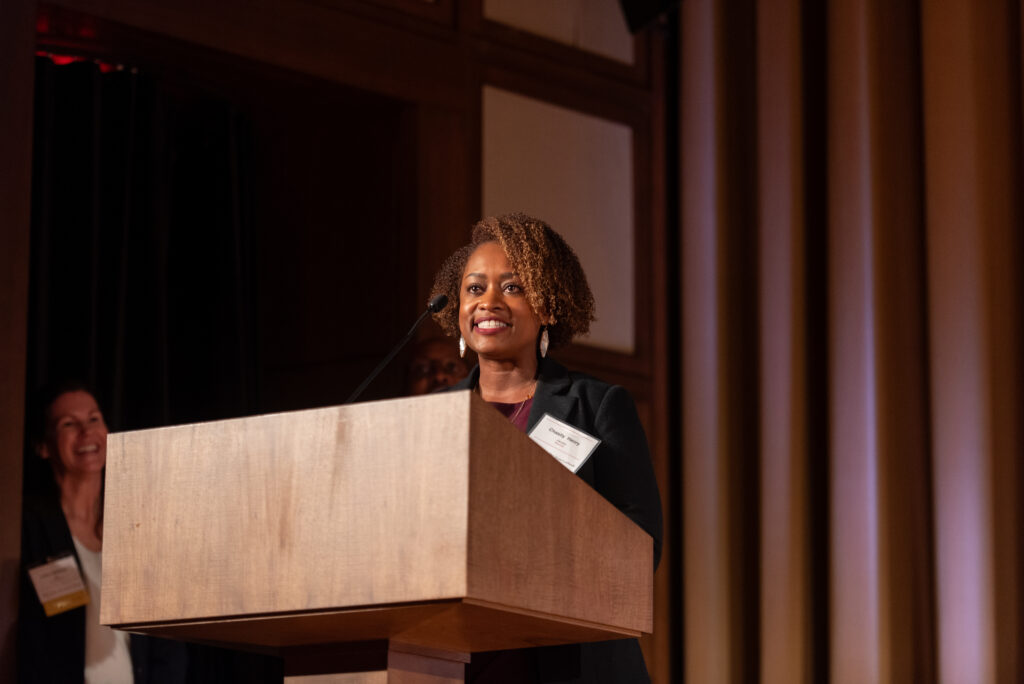
In January, the Association of Corporate Counsel’s DFW Chapter and The Texas Lawbook awarded Henry with the 2023 DFW Corporate Counsel Award for Senior Counsel of the Year for a Large Legal Department. (Pictured right: Henry giving her acceptance remarks at the awards ceremony)
This is the second time that ACC DFW and The Lawbook have honored Henry. She received the 2019 DFW Corporate Counsel Award for Achievement in Diversity.
“Chasity understands her role as a leader is to create a collaborative and positive environment so ideas and issues can be expressed,” said Amy Stewart of the Amy Stewart Law Group, who nominated Henry for the honor. “Chasity is a great listener and problem-solver. In meetings, she normally is the last to provide her feedback or opinions because she wants to understand everyone’s perspective before speaking. In general — on her career path and in every role she has held — she is admired, respected and leaves the organization is a much better place than where it was when she arrived.”
Jacobs General Counsel Justin Johnson said that Henry’s “strategic thinking sets her apart as a lawyer and leader.”
“Chasity has a keen ability to analyze complex legal issues, anticipate challenges and develop innovative solutions,” Johnson said. “Her strategic approach extends beyond legal matters to encompass overall organizational goals, positioning her as a key driver of success for both the legal department and Jacobs as a whole.”
“In terms of culture, Chasity is known for creating an inclusive and supportive work environment,” he said. “She values diversity and ensures that all team members feel heard and valued. This commitment to a positive culture not only enhances the overall well-being of her team but also contributes to increased productivity and effectiveness in achieving established goals and supporting the business.”
“Chasity has the ability to look at a problem, or even a situation where nobody else realizes there is a problem yet, and come up with a practical and effective solution to achieve the company’s goals,” Johnson said.
Henry said she has had several big successes in her two years at Jacobs — most of them “involve interactions with my team.”
“My best moments are when I’ve made an impact, which is one of my personal core values,” she said. “It’s really the little things, like receiving feedback from someone who joined the team relatively recently that they really love our monthly team meetings. I love supporting my team as they shine.”
Henry points out that she is “not the only one in my household striving to create change.” Her husband, Justin Henry, is senior counsel at McKesson and president of the Dallas Independent School Board.
“The work I do would not be possible without the partnership of someone who believes wholeheartedly in our responsibility to give back,” she said. “The time and effort he devotes to continuing to improve outcomes for students in one of the largest urban school districts in the country inspires me daily. I could not ask for a better or more supportive partner. He deserves a lot of credit for our ability to balance family, work and our other important commitments in the community.”
Henry was born and raised in Fort Worth. Her mother was a federal employee for several years and was able to stay home with her three children while they were growing up. Her father worked on an assembly line for some time, earning just enough money for the family to survive. He decided to become an air traffic controller, which required him to attend a three-month academy in Tulsa, Oklahoma.
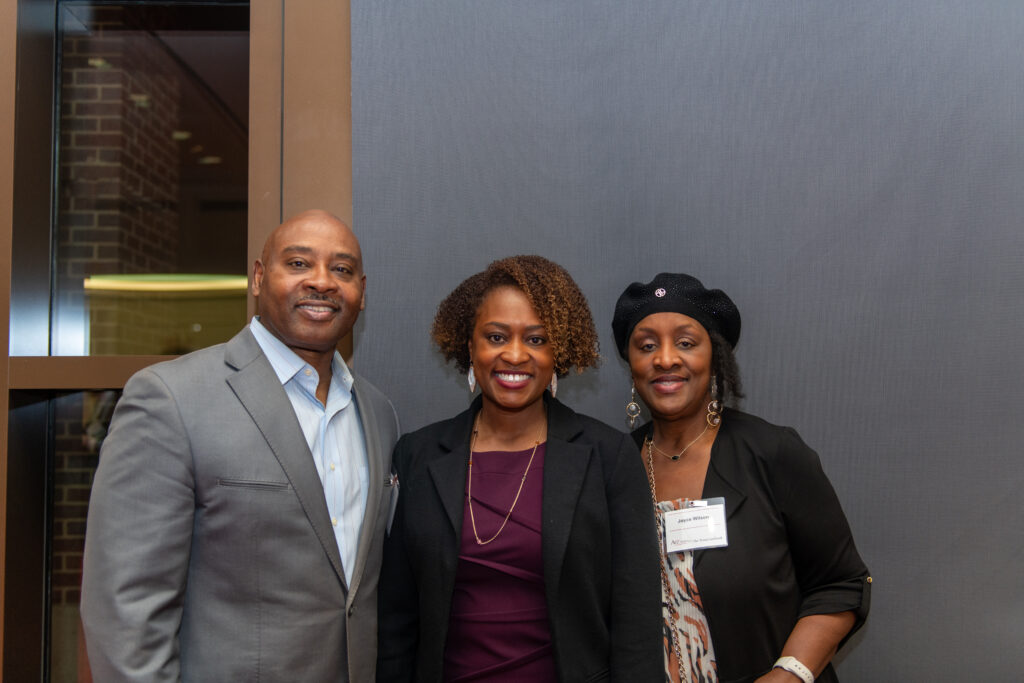
Henry and her parents at the DFW Corporate Counsel Awards ceremony in January
“The failure rate was in the 60th percentile,” she remembered. “Despite the challenges and risks, my dad quit his job and moved to Oklahoma to attend the academy.”
Her father’s hard work paid off. He graduated from the academy at the top of his class and was hired as an air traffic controller.
“It greatly increased our family’s opportunities,” Henry said in an interview in 2020. “Seeing him work hard to accomplish such a challenging goal and my mother’s partnership with him in that endeavor taught me valuable lessons that have stayed with me. When opportunities present themselves, take advantage and then put in the work to accomplish your goals.” When Henry was 10, her father showed her a “map of the sky where airplanes could fly.”
“On my first trip to Europe to study abroad in London, my dad called the pilot, who then announced over the speaker system that my dad had found them a shortcut for the flight,” she said.
Even as a child, Henry developed a bent toward the legal profession.
“I have always had a keen sense of what I perceive as what’s right and what’s wrong, what’s fair and what’s unfair, and a strong desire to advocate for what’s right and what’s fair,” she said.
As a little girl, Henry would tell her parents, “That’s not fair!”
Her mom and dad would respond, “Of course, life is not fair.”
“I wanted to dig deeper, make my case and chart a course for achieving my desired outcome,” she said. “Before long, adults would say ‘I think you’d make a great lawyer.’ The more I learned about what lawyers do — advocate for what’s right and what’s fair — I came to agree that being a lawyer made a lot of sense. I also watched a lot of Perry Mason reruns, courtesy of the Nickelodeon channel’s ‘Nick at Night.’ So, naturally, I thought every lawyer was a trial lawyer who dealt with interesting and challenging mysteries and struggled to find a solution but always solved the puzzle at the end of the day.”
“In those early days, my career path as a lawyer was solidified, but it would be many years before I had any idea that I would become a corporate lawyer or what that even meant,” she said.
Henry attended a magnet high school that focused on the medical profession, which required her parents to drive her a considerable distance to take her to classes daily.
“Though I clearly did not become a doctor, having the experience of attending an academically rigorous high school, and doing well allowed me to gain confidence in my ability to be successful in challenging environments,” she said.
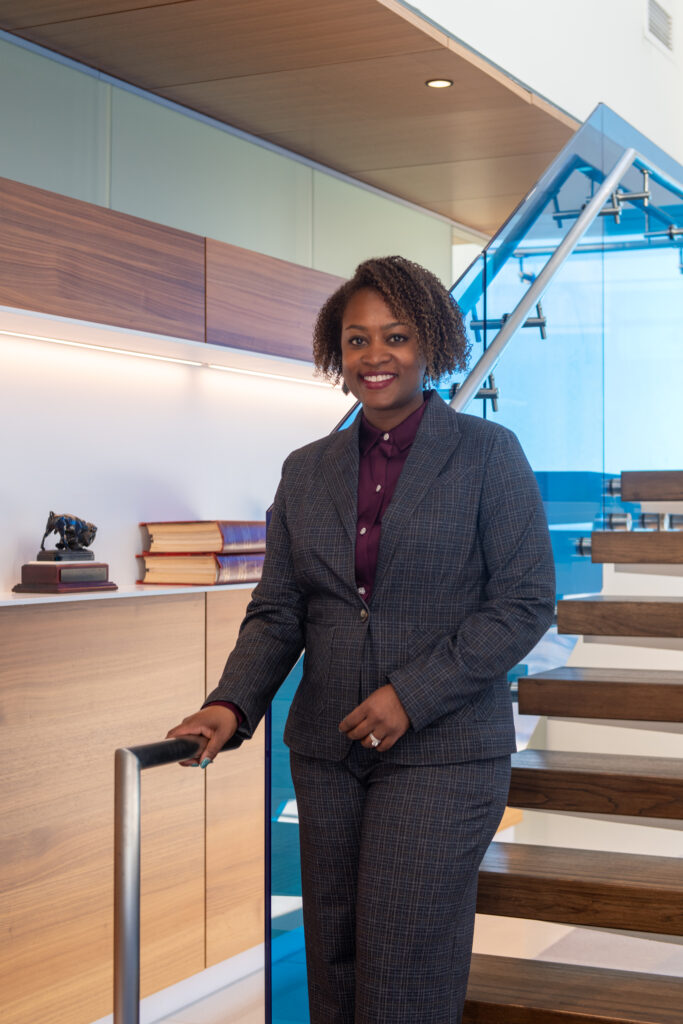
She attended Wheaton College, a highly respected liberal arts university founded in 1860 by Christian abolitionists. The college was a prominent stop on the Underground Railroad and is one of the top 20 universities in the U.S. in producing alumni with Ph.Ds.
For Henry, her time at Wheaton was a “life-changing” experience.
“College was the first time I spent any extended amount of time in the minority,” she told The Lawbook in a 2020 interview. “I grew up in a primarily African American neighborhood and attended an African American church and schools. I was in a fairly homogenous environment where differences were not based on ethnicity but rather just individual and family differences, income, education and access to opportunities.”
“While I knew about bias and discrimination in the broader society, I did not have practical, everyday experience, given my upbringing,” she said. “I was in somewhat of an African American working middle-class bubble. My parents had provided us with a comfortable life full of laughter and love, surrounded by family in friends.”
At Wheaton, Henry was one of very few minority students.
“That is also where I became very interested in racial equity, coming to realize why so many African Americans and other people of color lacked access to opportunities like the one I was taking advantage of by attending college,” she said. “It was eye-opening. I also began to realize the value of diversity and how having different perspectives in a room and around a table made a huge difference in whether and how we came to understand and appreciate differences.”
“The seeds for my commitment to diversity and inclusion were definitely sewn during those college years,” she said.
After graduating from Wheaton in 2003, Henry earned a law degree from University of Texas.
Henry spent four years practicing law at V&E and then went in-house in 2010 to Irving-based healthcare services firm Vizient. In 2015, she joined the legal department at Dr Pepper Snapple, where she helped lead the $1.7 billion acquisition of Bai Brands.
Kimberly-Clark Corporation hired Henry in October 2017 as its assistant general counsel for legal strategy. In 2020, she became the general counsel of CECO Environmental Corporation — a position she held for more than two years.
“Chasity has an innate ability to connect with people in a meaningful, personal way that attracts attention and demands respect,” said Elizabeth Brandon, partner in global disputes at Reed Smith. “These traits have caused her to be a great listener who not only identifies issues, but problem solves with creative thinking that is tailored to the individual or situation. People, myself included, are drawn to Chasity’s quiet confidence, work ethic, loyalty and ability to make them feel valued.”
“Chasity’s greatest strength is her savvy business acumen coupled with her consummate dedication for self-improvement and compassion,” Brandon said.
In 2015, Henry founded the NEW Roundtable, a nonprofit that brings together in-house and outside counsel with the mission of promoting the advancement of African American women lawyers. NEW stands for Network of Empowered Women. The organization is celebrating its 10th anniversary this October.
Henry helped launched the Diverse Attorney Pipeline Program in 2018. DAPP Direct is a career-readiness program for first-year women law students. Both the NEW Roundtable and DAPP have experienced strong successes in DFW.
In fact, Henry first met Jacobs Chief Legal Officer Joanne Caruso and GC Johnson through DAPP when Jacobs agreed to help a first-year law student through the initiative.
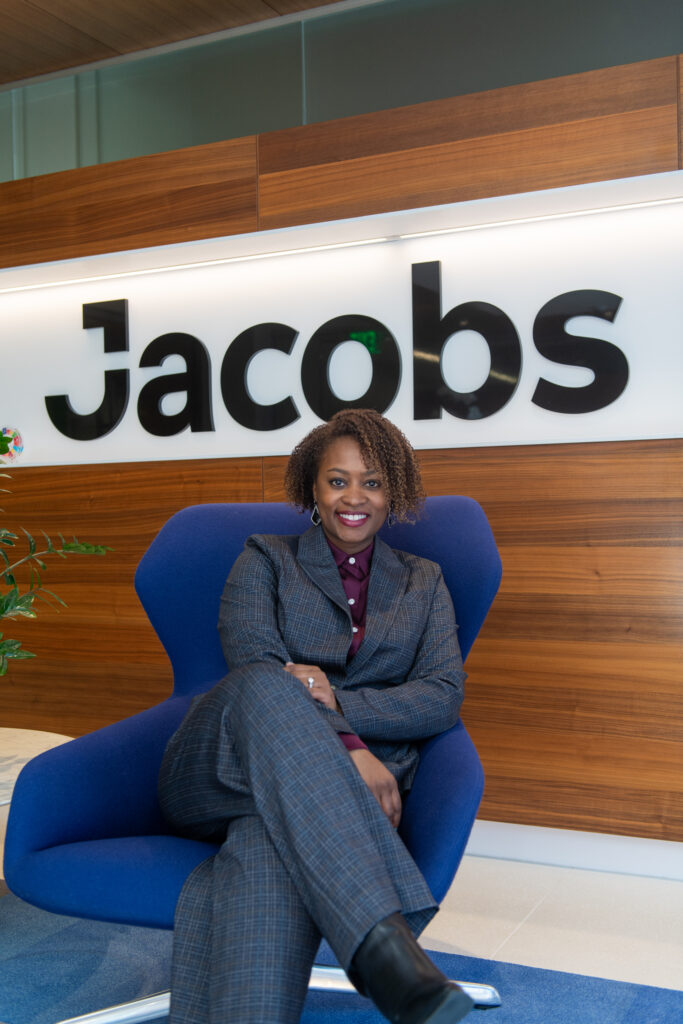
Henry joined Jacobs in March 2022 because company leaders “demonstrated how values and passion can align in the work that we do.”
“I observed and learned more about Jacobs, its impactful work to provide solutions to the world’s most pressing issues, including climate and infrastructure challenges and its tangible commitment to inclusion and diversity,” she said. “This includes bold and proactive steps to address racial injustice, such as its Action Plan for Advancing Justice and Equality, a five-year, $10 million commitment to support and impact Black communities.”
“When my dream role leading a team to directly partner with a major line business in driving its strategy arose at a company with values so clearly aligned with her own, I could not pass up the opportunity to join Jacobs,” she said. “The company correctly recognizes that it will be impossible to accomplish our enterprise goals without having great leaders at every level of the company.”
“Not only are there really critical substantive legal and business components of our team’s role within the organization, I feel a tremendous personal level of responsibility and accountability for enabling and empowering my team to deliver on our priorities in support of the business,” she said.
Soon after arriving at Jacobs, Henry partnered with the company’s human resources and learning and talent development teams to launch an in-person workshop centered on the principals found in The Speed of Trust, by Stephen M. R. Covey. The initiative explored 13 behaviors that build trust amongst people and teams and within companies.
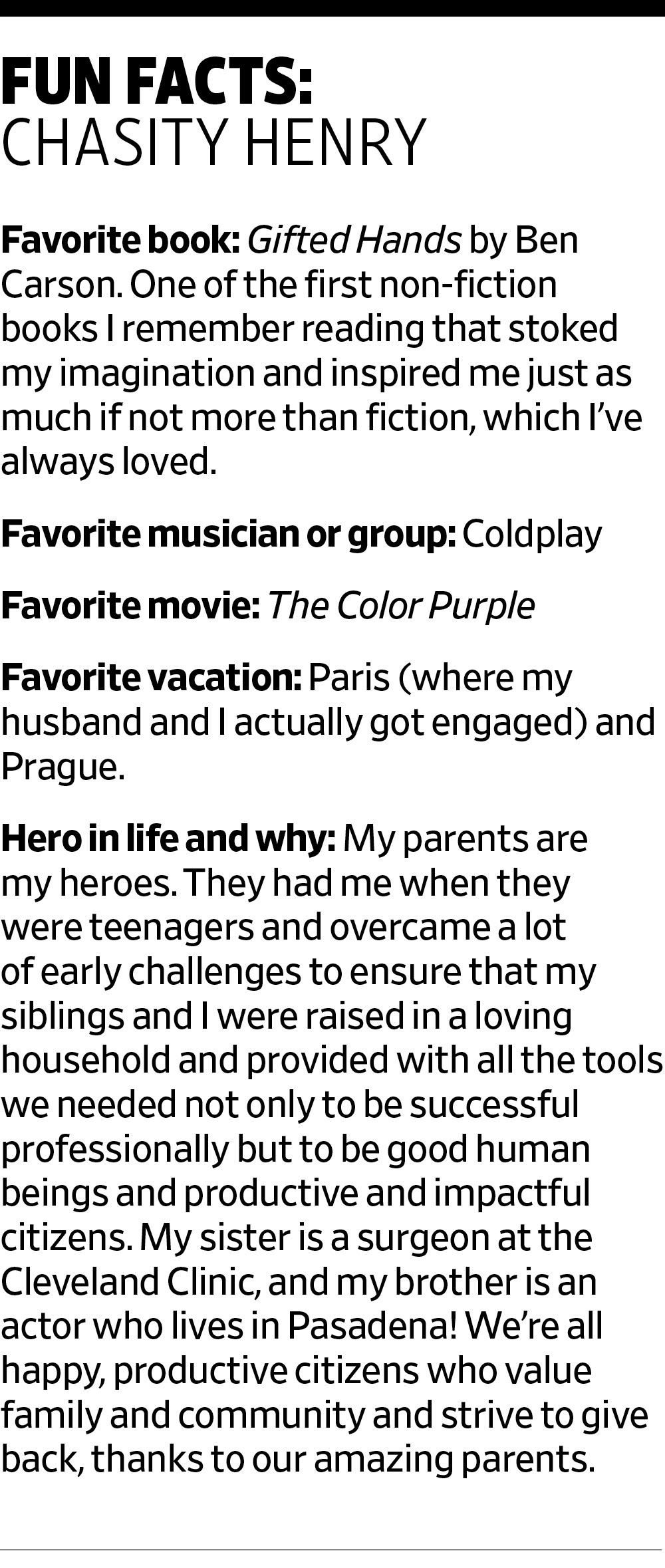
“After this initial workshop, the team and I spent the next 13 months exploring and building upon each of the 13 trust behaviors,” she said. “This helped to lay the foundation for our team to set and accomplish innovative and impactful goals and objectives throughout the next year.”
Perkins Coie partner Jill Louis said Henry is “the calm in any storm.”
“Chasity values people, development and leadership, and her actions bear that out,” Louis said. “Chasity is highly analytical. She ties her actions to things that create value for the company. Chasity knows how to create things that didn’t exist before. She is a true innovator.”
Jacobs Deputy General Counsel Sarah Wariner said Henry is a strong leader because her “objective is always to improve her team before focusing on herself and the fastest or easiest path forward.”
“As an example, if there is a disagreement in approach among her team, instead of dictating the path, she will facilitate a discussion with collaboration, where her team can take ownership of the solution,” Wariner said. “This allows her individual teammates an opportunity to step up and also allows for a solution that all can be satisfied with.”
“With regard to her role at Jacobs, she stepped into this role knowing that she would face many challenges uniting her team around her vision for our global company,” Wariner said. “Chasity embraced that challenge and within her first few months worked to build trust with her team. This was no small task. That has paid off exponentially as she has been able to effectively drive change with the aid of her team.”
Henry agrees that the political and legal landscapes regarding DEI have shifted during the past two years.
“It may now be more challenging for companies to express support for DEI and to act accordingly,” she said. “But now, more than ever, companies have the opportunity to hold true to their values. At Jacobs, one of our core values is ‘we live inclusion.’ This is something that impressed me about Jacobs before I ever joined the company and continues to resonate with me now.”
“When we emphasize inclusion, along with diversity and equity, we make our companies and our societies better for everyone,” she said. “Given recent rulings, there may be certain words or phrases or types of programs under attack, and we should all ensure that we’re complying with laws. I believe that the goal of achieving diverse, equitable and inclusive spaces for all has not been altered by recent rulings.
“We cannot allow attacks on DEI to hamper our ongoing efforts to achieve this goal,” Henry added. “It will take hard work and there will undoubtedly be more challenges, but I’m encouraged by all those who have resolved to push forward.”
Premium Subscriber Q&A: Henry expands her comments on diversity and inclusion efforts and offers tips for outside counsel in this Q&A.
